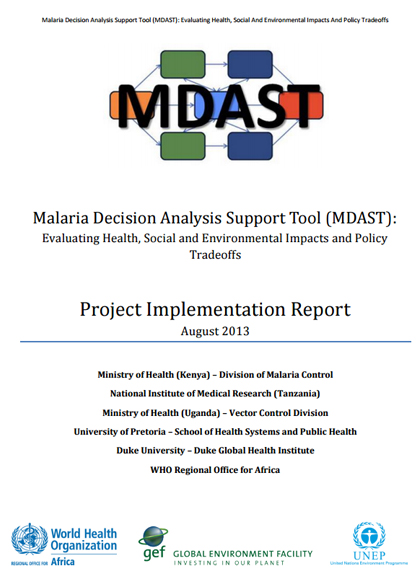
Malaria Decision Analysis Support Tool (MDAST)
Evaluating health, social and environmental impacts and policy tradeoffs
Project Implementation Report August 2013
The Malaria Decision Analysis Support Tool (MDAST) project sought to improve the protection of human health and the environment by promoting sustainable malaria control strategies that are consistent with the successful implementation of the Stockholm Convention on Persistent Organic Pollutants (POPs).
The project was developed in a collaborative manner with various stakeholders involved in malaria control policy making and implementation, and responded to a need for capacity building for improved policy formulation. The aim of MDAST is to promote evidence-based, multi-sectoral malaria control policy-making in Kenya, Tanzania, and Uganda, with the project serving as pilot for other malaria-prone countries. The key project partners were UNEP/GEF, WHO-AFRO, Ministry of Health, Uganda, Ministry of Health, Kenya, National Institute of Medical Research, Tanzania, University of Pretoria, and Duke University.\
The project focused on achieving four main outcomes:
- Development of a Malaria Decision Analysis Support Tool (MDAST) that jointly incorporates health, social and environmental priorities for malaria control in Kenya, Tanzania, and Uganda.
- Increased capacity for evidence-based malaria control policy making through the use of MDAST in Kenya, Tanzania, and Uganda.
- Creation of an agenda for policy-relevant malaria research through development of MDAST and identification of key knowledge gaps.
- Elucidation of requirements for replication of MDAST in other malaria-prone countries around the world.


